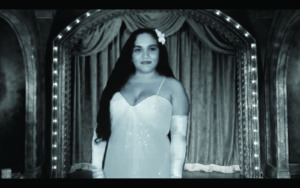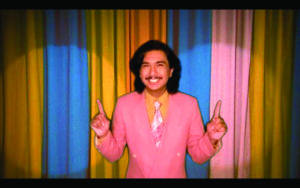By SOL MEZTLI GARCIA
University of Texas Rio Grande Valley theatre student Mateo Ramirez channeled his frustration from not being able to entertain others due to the pandemic into a virtual production over the weekend, highlighting marginalized voices.

Courtesy screenshot photo by Sol Garcia
The production, “Out of the Canon: A Celebration of Latinx, BIPOC, LGBTQ+ and Women’s Voices” was overseen by Ramirez’s professor, Jennifer Saxton.
“I would stay after (class at UTRGV), and it was just her and I,” Ramirez said. “It’s really depressing, and I knew that there were people who weren’t able to be on campus, and I finally told her ‘Let’s figure something out because we can’t just be sitting here.’ It’s painful, and she totally agreed.”
(Read: UTRGV Latino theater organization takes part in international festival)
By November, the sophomore and Saxton, a UTRGV theatre associate professor, selected a cast of UTRGV students to participate in the show.
The pandemic limited the number of members who could get together, meaning the cast was unable to meet as a whole group at once — so they performed a production consisting of monologues, poems, a song and one original piece by Ramirez.
The pieces included Chilean poet Pablo Neruda’s “Tonight I can Write,” English writer Aphra Behn’s “The Feign’d Courtezans,” and ten other works, including two delivered in Spanish and another in American Sign Language.
“Usually, theater is written by an old, white guy, and if it’s not written by old, white guys, it’s written by a new white guy,” said Ramirez, who also served as a co-director, costume designer and editor. “We said we were just kind of tired of that, and we decided to have playwrights from all over, from all these different times.”
Since there was a variety of works, Saxton suggested “Out of the Canon” should be set up as if the viewer was flipping channels on a TV or channel-surfing. The channels range from a news broadcast to a classic movie to more.

Courtesy screenshot photo by Sol Garcia
“I said that’s perfect,” Ramirez remembered. “I really wanted this project to just be something fun and to have people understand it, so that was a fun way to do that — using that kind of TV aspect to tell the stories in different ways.”
To ensure everyone’s safety, “Out of the Canon” was filmed completely online. Ramirez and Saxton delivered green screens and costumes to the cast, so they could record their piece from home while using a background.
Cast members would virtually rehearse every Wednesday and then rehearse one-on-one with another member on a weekly basis.
“Aside from being really, really productive, it was also a chance to get that sense of that there’s people there,” Ramirez said. “That was a great reminder of that.”
Many challenges arose while producing “Out of the Canon,” including the winter storm that left some cast members without utilities and damaged the storage area, where the costumes had been held.
“The hurricane hit our costume storage and took the roof off,” Saxton said. “800 square feet, packed full of costumes, suddenly waterlogged and moldy, so we didn’t have any costumes. The costumes that we used for the show came out of my house.”
Because of that and other issues, “Out of the Canon” had to be postponed on more than one occasion.
However, the cast and creative team’s commitment never faltered.
“Even in those moments, we still had people going, ‘Hey, when can I rehearse with you? Let’s get back into it,’” Mateo said. “That was really great to see because I just knew they were missing it. I was missing it. That was a really, really rewarding thing to see because theatre is really–it’s community.”
Ramirez has been involved in theatre since the third grade, but this was his first time directing a UTRGV Theatre Department production. He’s proud of “Out of the Canon” and believes it will stay with him and the cast forever, he said.
“Now that it’s over, we know what to fix. We know what to do better and let’s say … that they say ‘OK you can go back to having a bunch of people in a room,’ then it’s a great learning lesson, but either way it’s not something we forget,” he said.
“Out of the Canon” became available to stream on Vimeo on Friday, and Ramirez has heard positive feedback on it.
“The coolest thing about it is that it got people excited. I had people text me … ‘That was fun, thank you,’” he said. “It was a part of our lives that we missed having around.”
“Out of the Canon” ends with Ramirez’s piece, which reflects his frustration with the pandemic and carries an important message for the viewers.
“The point that I was trying to make when I wrote that was just how important all of this is,” he said. “We take art for granted. We take stories for granted a lot of times … My piece was asking them why do they want it, and you can want it but also contribute to it.”
Ramirez hopes “Out of the Canon” shows viewers theatre can be accessible for all, but especially for Valley natives.
“I’d love for people to understand that theatre should be accessible,” the Brownsville native said. “Theatre should be cookie crumbs. It should be everywhere … You can sit down, and if you have a good team and good people, you can find a way to tell a story that reflects your audience and that is so much more powerful.”
Saxton said since the Rio Grande Valley was heavily impacted by COVID-19, she hopes people see that “Out of the Canon,” is easily accessible at no cost.
“COVID hit the Valley so hard, I hope people take away the idea that we’re offering them a little bouquet of all these writers,” she said.
Sol Meztli Garcia is a student at the University of Texas Rio Grande Valley.



